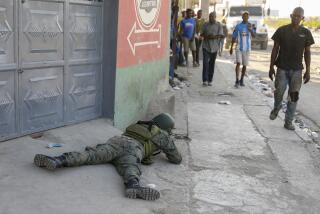U.S. Fails to Use Intelligence Outlets in Haiti, Critics Say : Policy: Officials claim the White House is unwilling or unable to utilize the CIA and other resources to deal with global flash points.
- Share via
WASHINGTON — The Clinton Administration is coming under increasing fire for failing to marshal the U.S. intelligence community’s vast resources to deal with the Haiti crisis, either as an alternative to military action or to soften the ground before American intervention.
Critics ranging from congressional officials to the Administration’s own foreign policy specialists are concerned the United States appears to be nearing intervention without first using intelligence mechanisms to undermine Lt. Gen. Raoul Cedras, the Haitian strongman, or to undertake other operations to pressure his regime.
President Clinton has not even issued a “finding,” which directs the intelligence community to undertake secret operations, American sources said. Without such a finding, the CIA does not have the authority to initiate even simple actions.
“The Administration has not been real thoughtful or strategic in knowing what they wanted to do in Haiti. Consequently, policy appears to be disjointed,” said Sen. Dennis DeConcini (D-Ariz.), chairman of the Senate Select Committee on Intelligence.
But the issue extends beyond Haiti, several sources asserted. They said the White House seems to be unwilling or unable to effectively use the CIA, the Defense Intelligence Agency and almost a dozen other U.S. intelligence outlets in dealing with several global flash points.
“Probably the most talented part of the government in the foreign policy area, in terms of brain power, entrepreneurial thinking, creativity and imagination, is in the intelligence community. . . . But the National Security Council does not use the intelligence apparatus or capabilities as much as it might,” a leading congressional specialist said. “It reflects a very disinterested attitude on behalf of the White House.”
The White House refused to comment.
But a senior CIA official said the intelligence community does not believe it is underused. “This is not a business that is languishing in terms of demand,” he responded. “This Administration is a voracious consumer of intelligence information. We have more work than we can deal with, generated by the (foreign policy) market, not ourselves.”
But the deepening Haitian crisis has highlighted the issue with new urgency in several quarters. The general concern and frustration was explained by a key congressional source who called Haiti “a situation ripe for intelligence cultivating. The Administration should use all the resources and tools available to it to avoid military operations. And, frankly, that’s not been done,” he said. He added that there is “a great deal of interest” in covert options to pressure Cedras.
The criticism is not based in partisan politics. Indeed, much of the concern originates with Democrats and regional specialists who historically have been reluctant, even skeptical, about secret operations, including in Haiti before the December, 1990, election of President Jean-Bertrand Aristide. Aristide was forced from office by the nation’s military nine months later.
*
Many of the critics are Administration insiders who now are encouraging more active use of the CIA and its sister agencies to make a difference at a critical juncture in Haiti, well-placed sources said. “It’s not an irresponsible thing to consider that the intelligence community could have a role in Haiti right now that might either prevent military action or might need to be done in advance of military action,” one source said.
Rep. Bill Richardson (D-N.M.), a House whip and member of the House Intelligence Committee who recently traveled to Haiti, has written the White House suggesting more active use of U.S. intelligence in the crisis, the well-placed sources said. Richardson’s office refused to confirm the report.
DeConcini and others also said the Administration had focused for too long on the Haitian refugee problem without determining what to do about the illegal government that forced a democratically elected leader from power.
The growing chorus of critics is now charging that the Haitian experience is symptomatic of a broader problem. “The White House has been rather disengaged from the role of the agency and intelligence or the problems in intelligence collection,” one well-informed critic said. “So we’re continuing to bump along using our intelligence resources in an ad hoc, hit-or-miss way.”
The critics blamed the failure on a range of factors. Philosophically, the Administration is not steeped in the use of intelligence capabilities, DeConcini said.
Clinton has also committed himself to multinational diplomatic efforts in many hot spots, which potentially could be jeopardized by a unilateral covert operation. “They don’t want to take the risks involved and that’s not necessarily bad. You take a lot of chances with your credibility,” DeConcini said.
Others blamed Administration indecision and ambivalence about how aggressive or active it wants to be in a post-Cold War world.
More to Read
Sign up for Essential California
The most important California stories and recommendations in your inbox every morning.
You may occasionally receive promotional content from the Los Angeles Times.













